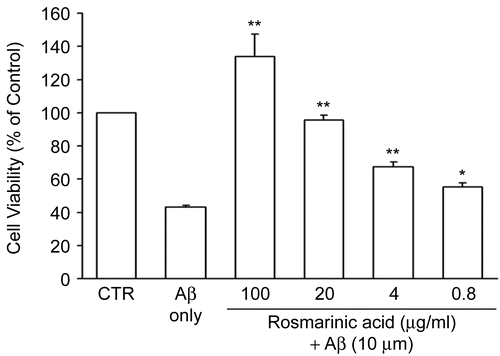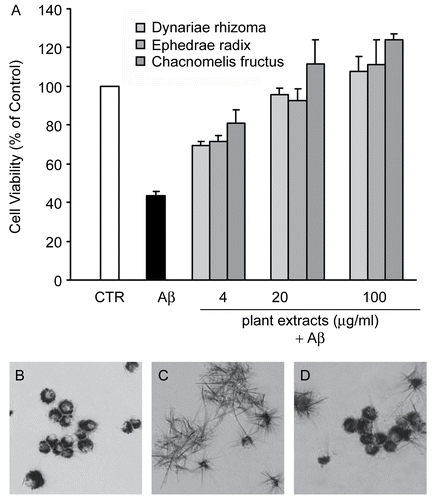Figures & data
Figure 1. Rosmarinic acid inhibited Aβ (25–35)-induced cell death in PC12 cells. Different concentrations of rosmarinic acid were applied to PC12 cells for 1 h prior to treatment with 10 μM Aβ (25–35). The cell viability was measured by MTT assay. The absorbance of 0.1% DMSO-treated cells (controls) was set at 100%. The results are expressed as mean ± SEM from three independent experiments, each performed in triplicate. * p < 0.05, ** p < 0.01 compared to 10 μM Aβ (25–35).

Table 1. Traditional oriental herbal medicines that demonstrated a neuroprotective effect against Aβ insult.
Figure 2. The methanol extracts of C. sinensis, E. sinica, and D. fortunei protected PC12 cells against Aβ in a dose-dependent manner. (A) Different concentrations of methanol extracts from C. sinensis, E. sinica, and D. fortunei were incubated with PC12 cells for 1 h, followed by 24 h incubation with 10 μM Aβ (25–35). Resulting cell viabilities were measured using MTT assay. The absorbance of 0.1% DMSO-treated cells (controls) was set to 100%. The results are expressed as mean ± SEM from three independent experiments, each performed in triplicate. (B–D) The methanol extract from D. fortunei (10 μg/mL) was incubated with PC12 cells for 1 h, followed by 24 h incubation with 10 μM Aβ (25–35). The morphological changes of PC12 cells induced by Aβ were examined under a microscope after incubation with MTT for 1 h (×200). Note that DMSO-treated negative controls (B) and cells treated with the extract from D. fortunei (D) and Aβ generated MTT-formazan granules, whereas Aβ-treated cells (C) formed MTT-formazan spikes. Bar = 10 μm.
